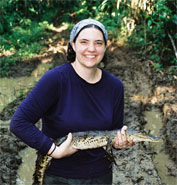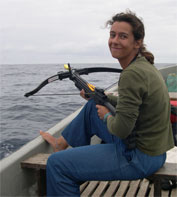Students
Jacqueline Ay-Ling Loo
PhD student, Dept. of Biology, New York University
Jacquie's doctoral research integrates molecular analyses at multiple marker systems, with life history data collected from humpback whale populations on the South Atlantic and Southwestern Indian Oceans to address questions regarding population structuring. Essentially, she is evaluating the extent to which dispersal, ranging from seasonal migrations to local movements, influences genetic patterns at temporal and hierarchical geographical scales.
- Soto AM, Loo J, and Marky LA. 2002. Energetic contributions for the formation of TAT/TAT, TAT/CGC+, and CGC+/ CGC+ base triplet stacks. Journal of the American Chemical Society 124, 14355-14363.
Martin Mendez
PhD student, Dept. of Ecology, Evolution, and Environmental Biology (E3B), Columbia University

Martin Mendez received his Licenciatura en Ciencias Biologicas, at the University of Buenos Aires, completing his graduating research on population genetics of yellow anacondas in northern Argentina. He became part of Fundacion Aquamarina, a local NGO focusing on marine conservation, and has been ever since strongly involved with cetacean conservation in coastal Buenos Aires and in Patagonia. With the Aquamarina team, Martin applied genetic tools to the conservation of Franciscana dolphins, an endangered species endemic to the western South Atlantic. Martin is currently a Wildlife Trust graduate fellow at the Ecology & Evolutionary Biology Doctoral Program at Columbia University, and part of the Cetacean Conservation and Research Program at WCS and AMNH. His research focuses on the population genetics and demographics of coastal cetaceans in Argentina, West Africa, Madagascar and Oman. His main interests are the development of appropriate tools to uncover population boundaries in cetaceans and to characterize key demographic processes influencing their survival, in order to apply that knowledge to management of marine protected areas and species conservation. Other research topics include conservation genetics of yellow anacondas, and the interface between population biology and population genetics.
- Mendez M, Rosenbaum HC, Bordino P. 2008. Conservation genetics of the franciscana dolphin in Northern Argentina: population structure, by-catch impacts, and management implications. Conservation Genetics 9(2), 419-435.
- Mendez M, Waller T, Micucci P, Alvarenga E, and Morales JC. 2005. Genetic population structure of the yellow anaconda (Eunectes notaeus) in Northern Argentina: management implications. pp 405-415, In: Biology of the Boas and Pythons. Henderson RW, Powell R, Editors. Eagle Mountain Publishing, LC.
- Waller T, Parera A, Giraudio A, Aprile G, Bortoluzzi A, Uhart M, Solís G, and Mendez, M. 2004. Fauna del Iberá: Composición, estado de conservación y propuestas de manejo. Fundación Biodiversidad, GEF/PNUD ARG02/G35 project. Asociación Civil Ecos Corrientes – PNUD y Gobierno de la Provincia de Corrientes.
- Bordino P, Kraus S, Albareda D, Fazio A, Palmerio A, Mendez M, and Botta S. 2002. Reducing incidental mortality of Franciscana dolphin Pontoporia blainvillei with acoustic warning devices attached to fishing nets. Marine Mammal Science 18(4), 833-842.
Kari L. Schmidt
PhD student, Dept. of Ecology, Evolution, and Environmental Biology (E3B), Columbia University

Kari was born and raised in rural Iowa. She completed her undergraduate education at St. Olaf College, earning a B.A. in both Biology and Sociology/Anthropology. After graduating in 2001, she worked as a research assistant in the Microbiology Department at the University of Iowa. She spent the summer of 2004 at Omaha's Henry Doorly Zoo, where she was an intern in animal husbandry and worked as a laboratory technician in the zoo's Genetics Department. Kari is currently a PhD student at Columbia University. She also participates in the Species Survival Plan (SSP) for Western lowland gorillas.
Kari's research interests include the identification of conservation units, the genetic effects of fragmentation, and the interface between in situ and ex situ conservation efforts. She has become increasingly interested in Neotropical parrots and is conducting research with both thick-billed parrots and scarlet macaws. Her work addresses questions that range from the identification of phylogeographic patterns across a species' range to population-level studies to assess the genetic variation of small fragmented populations or help maximize captive-breeding programs. The goal of her research is to provide detailed genetic information to enhance current conservation efforts and provide context for possible future metapopulations management.
Visiting Students
Inês Carvalho
Ph.D. student, Faculty of Marine and Environmental Sciences, University of Algarve, Portugal

Inês is a Ph.D. student at the University of Algarve and a doctoral fellow of the Portuguese Foundation of Science and Technology. Her research focuses on abundance, site fidelity and population structure of humpback whales (Megaptera novaeangliae) in Sâo Tomé and Prí ncipe. Inês studied biology at the University of Lisbon, where she carried out a thesis on the behavior of bottlenose dolphins, Tursiops truncatus. During her Master's degree in ethology at the Institute of Applied Psychology, she studied the occurrence and behavior of humpback whales in Sâo Tomé and Prí ncipe. Her research was undertaken while she was a reearch biologist at the Portuguese Center for the Study of Marine Mammals.
Mitchell J. Eaton
Ph.D. candidate, Dept. of Ecology and Evolutionary Biology, University of Colorado

Mitch received his M.S. in Conservation Biology & Ecology from the University of Minnesota, evaluating several harvest index methods to monitor subsistence hunting in central African forests. His current study focuses on integrating field-based research and laboratory tools to improve the management of wildlife resources in tropical forests. Mitch is investigating the ecology, dynamics, and spatial genetic structure of African dwarf crocodile (Osteolaemus tetraspis) populations in Loango National Park, Republic of Gabon. He combines capture-mark-recapture, radio telemetry and molecular data to estimate dispersal rates and evaluate landscape features that promote or restrict crocodile movement. Mitch has designed a long-term monitoring program in the Lac Tele Community Reserve, northern Republic of Congo, to quantify subsistence and commercial harvesting of fish, crocodiles and other wildlife. He will apply crocodile harvest-rate data to population growth models to evaluate the effect of hunting on population age structure and persistence. Spatial structure and dispersal rates will be compared to traditional harvest catchment zones to predict source-sink dynamics between hunted and non-hunted populations. These data will be used to develop techniques for improved spatial management of this important wildlife resource.
- Eaton MJ. 2006. Ecology, conservation and management of the Central African dwarf crocodile (Osteolaemus tetraspis). pp. 84-95, Crocodiles: Proceedings of the 18th Working Meeting of the IUCN-SSC Crocodile Specialist Group. IUCN, Gland, Switzerland.
- Thorbjarnarson JB, Eaton MJ. 2004. Preliminary examination of crocodile bushmeat issues in the Republic of Congo and Gabon. pp. 236-247, Crocodiles: Proceedings of the 17th Working Meeting of the IUCN-SSC Crocodile Specialist Group. IUCN, Gland, Switzerland.